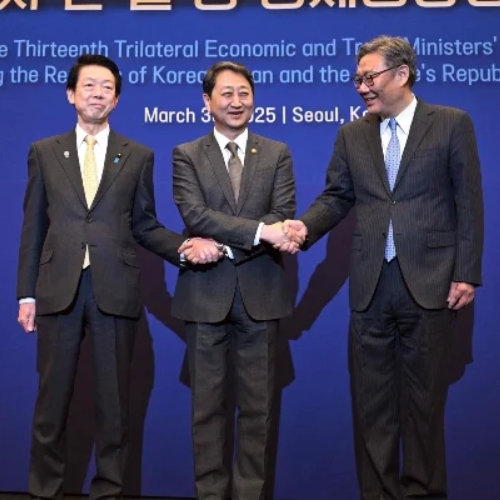In a significant move to counter increasing trade pressures from the United States, China, Japan, and South Korea have decided to unite against rising tariffs imposed by the US. These three major Asian economies held their first economic discussions in five years, resulting in an agreement aimed at strengthening their trade relations and enhancing cooperation on supply chains.
This agreement was finalized after a key meeting held recently, demonstrating the countries’ determination to respond collectively to the growing trade challenges from the US.
The main objective of these talks was to find strategies to protect their economies from the effects of new tariffs expected to be imposed by the US. This collaboration is seen as a direct response to the trade policies under US President Donald Trump.
The US has been placing tariffs or taxes on imports from various countries, leading to escalating tensions in global trade. In light of these measures, China, Japan, and South Korea are seeking to safeguard their own economic interests and minimize the impact of these new tariffs.
Japan, China and South Korea Forced to Come Together
Strategic Cooperation on Supply Chains
A central focus of the discussions was to enhance supply chain cooperation between China, Japan, and South Korea. Supply chains play a vital role in ensuring that countries can acquire the necessary materials and products to produce goods. By strengthening their collaboration, these countries aim to ensure that trade remains uninterrupted, even in the face of growing US tariffs.
A key point discussed was how Japan and South Korea would import semiconductor raw materials from China. Semiconductors are essential components used in a wide range of products, including smartphones, computers, and cars. In return, China is eager to procure chip products from both Japan and South Korea, which are known for their expertise in semiconductor technology.
This mutual exchange of products will help ensure that both sides maintain access to crucial technology and resources, especially as tensions with the US intensify.
Intel CEO Gelsinger Warns: US Sanctions on China Could Backfire on American Chipmakers
The countries also discussed continuing negotiations on export controls. Export controls are government-imposed restrictions on what can be sold to other countries. With the US increasing its economic pressures, these nations are looking for ways to maintain smooth trade flows and minimize disruptions in critical industries, such as electronics and advanced technology.
Exploring a Free Trade Agreement
Another major topic discussed was the potential for a trilateral free trade agreement (FTA) between China, Japan, and South Korea. A free trade agreement is a pact between countries that reduces or eliminates tariffs and other trade barriers, making it easier to exchange goods and services. The three countries are exploring the possibility of forming such an agreement, which would boost their economic ties and facilitate more efficient trade.
If they move forward with a free trade agreement, these nations aim to enhance their economic growth, strengthen their trade relations, and mitigate the impacts of US tariffs. The agreement could provide opportunities for businesses by promoting greater trade between the three countries. This cooperation is seen as a way to make their economies more resilient in the face of external pressures, particularly from the US.
Japan’s Auto Empire Under Siege as Trump’s 25% Auto Tariffs Inflict Massive Damage
The trade ministers of China, Japan, and South Korea emphasized the importance of regional cooperation during the talks. They also discussed how the three nations can work together to foster global trade partnerships. While the idea of a free trade agreement is still in the negotiation phase, it signals their intent to deepen their economic relationship and work together to counter the impact of tariffs imposed by the US.
The US Factor: Rising Tariffs and Trade Tensions
This agreement comes at a time of escalating trade tensions between the US and its trading partners. US President Donald Trump has made it clear that he plans to impose new tariffs on imports from various countries, including China, Japan, and South Korea.
These tariffs are part of a broader strategy he calls “Liberation Day,” which aims to reduce the United States’ dependence on foreign goods. Trump’s plan involves imposing “reciprocal” tariffs, meaning that the US would introduce tariffs equal to the ones that other countries place on American goods.
Canada Cracks Down on Tesla Over Suspicious $30M Subsidy Claims
These new tariffs are part of an ongoing trade conflict between the US and several major economies, including China, Japan, and South Korea. In response to the growing pressure from the US, these countries are taking proactive steps to protect their economies and ensure that their trade relationships remain strong. By coming together, they aim to mitigate the impact of the tariffs and secure their economic futures.
The recent trade discussions between China, Japan, and South Korea mark the beginning of closer cooperation, particularly in areas like supply chains and potential free trade agreements. As trade tensions continue to affect global markets, the collaboration between these three Asian nations is seen as an important step in maintaining economic stability in the region. The three countries are committed to deepening their economic ties and ensuring that their trade flows remain strong despite external pressures.


